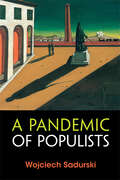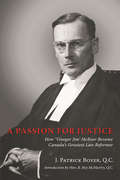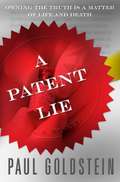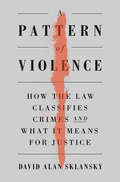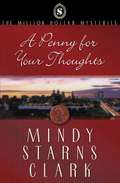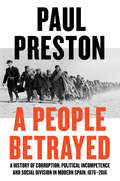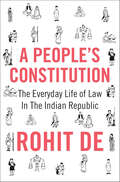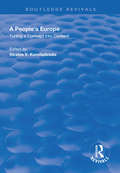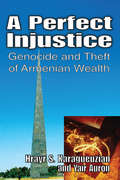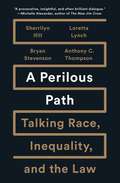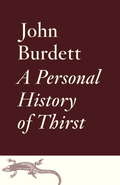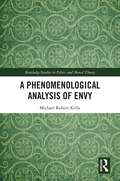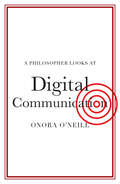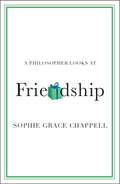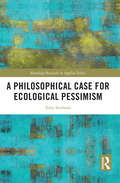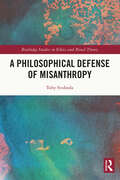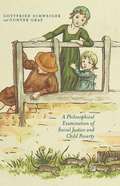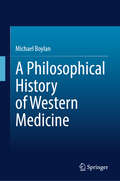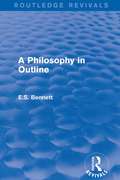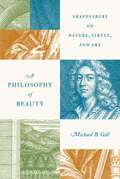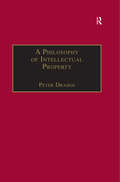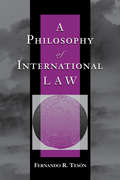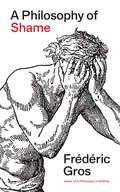- Table View
- List View
A Pandemic of Populists
by Wojciech SadurskiOver the last decade, the world has watched in shock as populists swept to power in free elections. From Manila to Warsaw, Brasilia to Budapest, the populist tide has shattered illusions of an inexorable march to liberal democracy. Eschewing simplistic notions of a unified global populism, this book unpacks the diversity and plurality of populisms. It highlights the variety of constitutional and extraconstitutional strategies that populists have used to undermine the institutional fabric of liberal democracy and investigates how ruling populists responded to the Covid-19 crisis. Outlining the rise of populisms and their governing styles, Wojciech Sadurski focuses on what populists in power do, rather than what they say. Confronting one of the most pressing concerns of international politics, this book offers a vibrant, contemporary account of modern populisms and, significantly, considers what we can do to fight back.
A Parent-Partner Status for American Family Law
by Weiner, Merle H. and Knight, Philip H. Merle H. Weiner Philip H. KnightDespite the fact that becoming a parent is a pivotal event, the birth or adoption of a child has little significance for parents' legal relationship to each other. Instead, the law relies upon marriage, domestic partnerships, and contracts to set the parameters of parents' legal relationship. With over forty percent of American children born to unwed mothers and consistently high rates of divorce, this book argues that the law's current approach to regulating parental relationships is outdated. A new legal and social structure is needed to guide parents so they act as supportive partners and to deter uncommitted couples from having children. This book is the first of its kind to propose a new 'parent-partner' status within family law. Included are a detailed discussion of the benefits of the status as well as specific recommendations for legal obligations.
A Passion for Justice: How 'Vinegar Jim' McRuer Became Canada's Greatest Law Reformer
by J. Patrick BoyerThis richly detailed biography illustrates how a determined Canadian seeking justice created an enduring legacy. Through vigorous battles, Jim McRuer’s passion for justice was translated into laws that daily touch and protect the lives of millions today. James Chalmers McRuer was not easy to get along with or even much liked by many lawyers who dubbed him ’Vinegar Jim.’ Yet countless others saw him as heroic, inspirational, a man above and apart from his times. His resolute focus on justice changed the lives of married women with no property rights, children without legal protection, aboriginals caught in the whipsaw of traditional hunting practices and imposed game laws, and prisoners locked away and forgotten. Environmental degradation and those causing it, murderers, stock fraud artists and Cold War spies all came within the ambit of J. C. McRuer’s sharp legal mind and passion for justice. Upon turning 75, McRuer embarked on his most important work of all, becoming Canada’s greatest law reformer and remaining active into his 90s.
A Patent Lie (Michael Seeley Mystery #2)
by Paul GoldsteinA gripping inside look at high-stakes lawyering, A Patent Lie is further evidence that Paul Goldstein is an emerging master of the legal thriller. After being forced from his high-powered Manhattan law firm, Michael Seeley--the tough-but-wounded hero of Errors and Omissions--has set up shop in his native Buffalo. Partly out of need, partly out of pride, Seeley takes on a case for his estranged brother, whose small biotech firm is suing a Swiss pharmaceutical giant over a controversial new AIDS vaccine.
A Pattern of Violence: How the Law Classifies Crimes and What It Means for Justice
by David Alan SklanskyA law professor and former prosecutor reveals how inconsistent ideas about violence, enshrined in law, are at the root of the problems that plague our entire criminal justice system—from mass incarceration to police brutality. We take for granted that some crimes are violent and others aren’t. But how do we decide what counts as a violent act? David Alan Sklansky argues that legal notions about violence—its definition, causes, and moral significance—are functions of political choices, not eternal truths. And these choices are central to failures of our criminal justice system. The common distinction between violent and nonviolent acts, for example, played virtually no role in criminal law before the latter half of the twentieth century. Yet to this day, with more crimes than ever called “violent,” this distinction determines how we judge the seriousness of an offense, as well as the perpetrator’s debt and danger to society. Similarly, criminal law today treats violence as a pathology of individual character. But in other areas of law, including the procedural law that covers police conduct, the situational context of violence carries more weight. The result of these inconsistencies, and of society’s unique fear of violence since the 1960s, has been an application of law that reinforces inequities of race and class, undermining law’s legitimacy. A Pattern of Violence shows that novel legal philosophies of violence have motivated mass incarceration, blunted efforts to hold police accountable, constrained responses to sexual assault and domestic abuse, pushed juvenile offenders into adult prisons, encouraged toleration of prison violence, and limited responses to mass shootings. Reforming legal notions of violence is therefore an essential step toward justice.
A Penny for Your Thoughts (The Million Dollar Mysteries, #1)
by Mindy Starns ClarkBusiness investigator Callie Webber finds herself looking into the sudden death of an old family friend of her employer.
A People Betrayed: A History Of Corruption, Political Incompetence And Social Division In Modern Spain
by Paul PrestonNowhere does the ceaseless struggle to maintain democracy in the face of political corruption come more alive than in Paul Preston’s magisterial history of modern Spain. The culmination of a half-century of historical investigation, A People Betrayed is not only a definitive history of modern Spain but also a compelling narrative that becomes a lens for understanding the challenges that virtually all democracies have faced in the modern world. Whereas so many twentieth-century Spanish histories begin with Franco and the devastating Civil War, Paul Preston’s magisterial work begins in the late nineteenth century with Spain’s collapse as a global power, especially reflected in its humiliating defeat in 1898 at the hands of the United States and its loss of colonial territory. This loss hung over Spain in the early years of the twentieth century, its agrarian economic base standing in stark contrast to the emergence of England, Germany, and France as industrial powers. Looking back to the years prior to 1923, Preston demonstrates how electoral corruption infiltrated almost every sector of Spanish life, thus excluding the masses from organized politics and giving them a bitter choice between apathetic acceptance of a decrepit government or violent revolution. So ineffective was the Republic—which had been launched in 1873—that it paved the way for a military coup and dictatorship, led by Miguel Primo de Rivera in 1923, exacerbating widespread profiteering and fraud. When Rivera was forced to resign in 1930, his fall brought forth a succession of feeble governments, stoking rancorous tensions that culminated in the tragic Spanish Civil War. With astonishing detail, Preston describes the ravages that rent Spain in half between 1936 and 1939. Tracing the frightening rise of Francisco Franco, Preston recounts how Franco grew into Spain’s most powerful military leader during the Civil War and how, after the war, he became a fascistic dictator who not only terrorized the Spanish population through systematic oppression and murder but also enriched corrupt officials who profited from severe economic plunder of Spain’s working class. The dictatorship lasted through World War II—during which Spain sided with Mussolini and Hitler—and only ended decades later, in 1975, when Franco’s death was followed by a painful yet bloodless transition to republican democracy. Yet, as Preston reveals, corruption and political incompetence continued to have a corrosive effect on social cohesion into the twenty-first century, as economic crises, Catalan independence struggles, and financial scandals persist in dividing the country. Filled with vivid portraits of politicians and army officers, revolutionaries and reformers, and written in the “absorbing” (Economist) style for which Preston is so revered, A People Betrayed is the first historical work to examine the continuities of political unrest and national anxiety in Spain up until the present, providing a chilling reminder of just how fragile democracy remains in the twenty-first century.
A People's Constitution: The Everyday Life of Law In The Indian Republic (Histories of Economic Life #7)
by Rohit DeIt has long been contended that the Indian Constitution of 1950, a document in English created by elite consensus, has had little influence on India’s greater population. Drawing upon the previously unexplored records of the Supreme Court of India, A People’s Constitution upends this narrative and shows how the Constitution actually transformed the daily lives of citizens in profound and lasting ways. This remarkable legal process was led by individuals on the margins of society, and Rohit De looks at how drinkers, smugglers, petty vendors, butchers, and prostitutes—all despised minorities—shaped the constitutional culture.The Constitution came alive in the popular imagination so much that ordinary people attributed meaning to its existence, took recourse to it, and argued with it. Focusing on the use of constitutional remedies by citizens against new state regulations seeking to reshape the society and economy, De illustrates how laws and policies were frequently undone or renegotiated from below using the state’s own procedures. De examines four important cases that set legal precedents: a Parsi journalist’s contestation of new alcohol prohibition laws, Marwari petty traders’ challenge to the system of commodity control, Muslim butchers’ petition against cow protection laws, and sex workers’ battle to protect their right to practice prostitution.Exploring how the Indian Constitution of 1950 enfranchised the largest population in the world, A People’s Constitution considers the ways that ordinary citizens produced, through litigation, alternative ethical models of citizenship.
A People's Europe: Turning a Concept into Content (Routledge Revivals)
by Stratos V. KonstadinidisFirst published in 1999. The aim of this book is to assess the impact of the rules of Community law or absence thereof of some issues which directly and intimately affect the level and quality of living in the European Union and to concentrate on problems experienced first- hand by a number of ordinary people working and living within the EU. Thus, the topics covered range from an attempt to define some key features of the nebulous and controversial concept of ‘citizenship of the Union’ to policy networks and implementation of the Union’s structural funds. Furthermore, in assessing and addressing intensity of the integrationist effort needed, academic specialists tackle the sex, religion and race aspects of discrimination within the Union, critically examine the EU immigration and asylum policy and the limited rights and particular treatment that various categories of third country nationals enjoy under Community and/or national law, analyse the external dimension of the Community’s Human Rights policy and seek to establish whether or not any common ground exists between the cultural identities of the Member States.
A Perfect Injustice: Genocide and Theft of Armenian Wealth
by Yair AuronExcept for a short period after the end of the First World War and the ensuing armistice, Turkey has consistently denied that it ever employed a policy of intentional destruction of Armenians. Th e 1913-1914 census put the number of Armenians living in Turkey at close to two million. Today only a few thousand Armenians remain in the city Istanbul and none elsewhere in Turkey. Armenian sites in Turkey, including churches, have been neglected, desecrated, looted, destroyed, or requisitioned for other uses, while Armenian place names have been erased or changed. As with the Jewish Holocaust, Armenian properties that were seized or stolen have not been restored. Sixty and ninety years after these terrible events, Jewish and Armenian victims and their heirs continue to struggle to get their properties back. Th ere has been only partial restitution in the Jewish case and virtually no restitution at all in the Armenian case. No adequate reparation for the deeds committed against the Armenians can ever be made. But resolving claims with respect to stolen property is a symbolic gesture toward victims and their heirs. Th is is unfinished business for Jewish heirs and survivor of the Holocaust, as it is for Armenians. A Perfect Injustice is an essential contribution to understanding why the issue of stolen Armenian wealth remains unresolved after all these years--a topic addressed for the fi rst time in this volume.
A Perilous Path: Talking Race, Inequality, and the Law
by Sherrilyn Ifill Bryan Stevenson Anthony C. Thompson Loretta LynchThis blisteringly candid discussion of the American dilemma in the age of Trump brings together the head of the NAACP Legal Defense Fund, the former attorney general of the United States, a bestselling author and death penalty lawyer, and a star professor for an honest conversation the country desperately needs to hear. Drawing on their collective decades of work on civil rights issues as well as personal histories of rising from poverty and oppression, these leading lights of the legal profession and the fight for racial justice talk about the importance of reclaiming the racial narrative and keeping our eyes on the horizon as we work for justice in an unjust time.
A Personal History of Thirst
by John BurdettFrom former British barrister John Burdett comes a psychosexual novel in the tradition of Damage and Presumed Innocent. At the heart of A Personal History of Thirst is an ill-fated love triangle where all hunger for something and are willing to risk everything to get it, blurring th eboundaries between right and wrong and love and hate to do so. Thirst tells a gripping tale of murder,r evenge, infidelity, ambition, and deception that keeps shocking until the stunning courtroom climax. Ambitious London lawyer James Knight, a propserous solciitor, has denied his lower-class background and carefully molded his publci image in order to climb the social and professional ladder of the British legal system. He will soon "take silk"--become a Queen's counsel barrister, the highest rank a alwyer can obtain.More than decade earlier, however, James had lived on the fringe of acceptable society and rigid British ethics during his years at university, experimenting with sex and drugs in a passionate love affair with a stunning and brilliant American named Daisy Smith.James's life takes an unexpected turn early in his career when he meets a client--an accused thief named Oliver Thirst--for a drink and a chat in a pub. Although they could not be more different, James is drawn to Thirst's high intelligence and wit. Soon their illicit friendship develops into a dark and erotic ménage á trois with Daisy at the center.Now, eleven years later, one is dead and two are suspected of murder. The murder investigation at the center of this impossible-to-put-down novel uncovers the bizarre love story between the barrister, the American, and the thief. And, in the end, A Personal History of Thirst answers the question: What happens when genuine love becomes mixed with perverse obsession?
A Phenomenological Analysis of Envy (Routledge Studies in Ethics and Moral Theory)
by Michael Robert KellyThis book provides a phenomenological analysis of envy. The author’s account takes a descriptive look at the whole experience of envy as it pertains to the envier’s sense of self and the envied.Philosophical work on envy has predominately focused on how the envier perceives, thinks about, or schemes against the person envied. This book proposes a phenomenological analysis of envy that articulates its essentially comparative character according to which we can further incorporate the role of the envier. This approach offers a novel contribution in three ways. First, it develops a notion of two predominant ways in which envy expresses itself: one that is bad for the envied and the other that is bad for the envier. Second, it renews the traditional defense of the view that envy is bad or vicious. Third, it provides original phenomenological descriptions of differences between envy and covetousness, indignation, emulation, ressentiment, and jealousy. By drawing on literary sources and social scientific literature, the author provides concrete examples of the lived experience of an envier.A Phenomenological Analysis of Envy will appeal to researchers and advanced students working in ethics, moral psychology, phenomenology, and philosophy of emotion.
A Philosopher Looks at Digital Communication (A Philosopher Looks At)
by Onora O'NeillCommunication is complicated, and so is the ethics of communication. We communicate about innumerable topics, to varied audiences, using a gamut of technologies. The ethics of communication, therefore, has to address a wide range of technical, ethical and epistemic requirements. In this book, Onora O'Neill shows how digital technologies have made communication more demanding: they can support communication with huge numbers of distant and dispersed recipients; they can amplify or suppress selected content; and they can target or ignore selected audiences. Often this is done anonymously, making it harder for readers and listeners, viewers and browsers, to assess which claims are true or false, reliable or misleading, flaky or fake. So how can we empower users to assess and evaluate digital communication, so that they can tell which standards it meets and which it flouts? That is the challenge which this book explores.
A Philosopher Looks at Friendship (A Philosopher Looks At)
by Sophie Grace ChappellWhat is it to be a friend? What does the role of friend involve, and why? How do the obligations and prerogatives associated with that role follow on from it, and how might they mesh, or clash, with our other duties and privileges? Philosophy often treats friendship as something systematic, serious, and earnest, and much philosophical thought has gone into how 'friendship' can formally be defined. How indeed can friendship be good for us if it doesn't fit into a philosopher's neat, systematising theory of the good? For Sophie Grace Chappell, friendship is neither systematic nor earnest, yet is certainly one of the greatest goods of life. Drawing on well-known examples from popular culture, and examining these alongside recent philosophical, political, social, and theological debates, Chappell demystifies and redefines friendship as a highly untidy and many-sided good, and certainly also as one of the most central goods of human experience.
A Philosophical Case for Ecological Pessimism (Routledge Research in Applied Ethics)
by Toby SvobodaOur current ecological crisis—featuring problems such as climate change, ocean acidification, and mass extinction—raises various moral issues, including a high probability of injustice and massive harm. This book defends a position called ecological pessimism, an attitude whose core feature is the belief that ecological catastrophe is likely to occur in the future.The author’s defense of ecological pessimism has two components. First, he makes the case that the relevant ecological facts about our world make ecological pessimism a reasonable, and indeed plausible, expectation. Second, he argues that ecological pessimism is morally and practically appropriate. Ecological pessimism is a distinctively moral kind of pessimism because the failure to avert ecological catastrophe leads to great ills for human beings and non-human nature. The author’s account responds to likely objections to ecological pessimism and makes the case against ecological optimism. Despite this, the author makes clear that being pessimistic about our ecological prospects is compatible with the melioristic project of improving our bad condition. He argues that environmental philosophy as a way of life, with its emphasis on environmental virtue and rich resources for developing spiritual exercises, is both a robust and attractive option for an ecological pessimist.A Philosophical Case for Ecological Pessimism will appeal to scholars and graduate students working on ethics and environmental philosophy.
A Philosophical Defense of Misanthropy (Routledge Studies in Ethics and Moral Theory)
by Toby SvobodaThis book argues that it can be both reasonable and appropriate to adopt a certain kind of misanthropy. The author defends a cognitivist version of misanthropy, an attitude whose central feature is the judgment that humanity is morally bad. Misanthropy is often dismissed on moral grounds. Many people hold that malice toward human persons is problematic and vulnerable to moral objections. In this book, the author advocates for cognitivist misanthropy. He defends an Asymmetry Thesis, according to which a morally bad deed carries more weight than a morally good deed, even if the harm of the former is exactly equal to the benefit of the latter. He makes the case that being misanthropic in the cognitivist sense is morally permissible and compatible with a broad range of moral reasons for action. He also considers the role of misanthropy in environmental thought, arguing that charges of misanthropy against certain "non-anthropocentric" views do not have the force they are typically thought to carry. Finally, the author investigates the practical implications of adopting cognitivist misanthropy, asking what living with such an attitude would involve. A Philosophical Defense of Misanthropy will appeal to researchers and advanced students working in ethics and the philosophy of human nature.
A Philosophical Examination of Social Justice and Child Poverty
by G. Schweiger G. GrafThis book is open access under a CCBY license. This book investigates child poverty from a philosophical perspective. It identifies the injustices of child poverty, relates them to the well-being of children, and discusses who has a moral responsibility to secure social justice for children.
A Philosophical History of Western Medicine
by Michael BoylanThis book provides an historical and philosophical overview of Western medicine along with commentary about how past principles affect current problems in biomedicine like genetic engineering, transhumanism, and a commitment to environmentalism. The book spans Ancient, Hippocratic and Galenic texts, Medieval writings, Modern contributions, and contemporary discoveries in the history and philosophy of medicine, including the growing role of technology in the practice of medicine. This book is of essential reading material for scholars and students interested in the history and philosophy of science as it relates to medicine, as well as those interested in the normative consequences of the study of nature for our contemporary world, particularly as it relates to medicine, environmental ethics, and genetic engineering.
A Philosophy in Outline (Routledge Revivals)
by E.S. BennettFirst published in 1931, this book provides a brief overview of the essentials of philosophy. It aims to combat the notion of the inaccessibility of philosophy by providing an introduction to its history and what the author believes to a ‘minimum dose…of incontrovertible philosophical truth’. The book merely assumes an ordinary level of adult education and offers an outline of the key areas of philosophy — consciousness, reality, experience, Life, God, love, aesthetics, conduct, logic — and as such will be of interest as a very useful starting point for anyone wishing to undertake further studies.
A Philosophy of Beauty: Shaftesbury on Nature, Virtue, and Art
by Michael B. GillAn engaging account of how Shaftesbury revolutionized Western philosophyAt the turn of the eighteenth century, Anthony Ashley Cooper, the third Earl of Shaftesbury (1671–1713), developed the first comprehensive philosophy of beauty to be written in English. It revolutionized Western philosophy. In A Philosophy of Beauty, Michael Gill presents an engaging account of how Shaftesbury’s thought profoundly shaped modern ideas of nature, religion, morality, and art—and why, despite its long neglect, it remains compelling today.Before Shaftesbury’s magnum opus, Charactersticks of Men, Manners, Opinions, Times (1711), it was common to see wilderness as ugly, to associate religion with fear and morality with unpleasant restriction, and to dismiss art as trivial or even corrupting. But Shaftesbury argued that nature, religion, virtue, and art can all be truly beautiful, and that cherishing and cultivating beauty is what makes life worth living. And, as Gill shows, this view had a huge impact on the development of natural religion, moral sense theory, aesthetics, and environmentalism.Combining captivating historical details and flashes of humor, A Philosophy of Beauty not only rediscovers and illuminates a fascinating philosopher but also offers an inspiring reflection about the role beauty can play in our lives.
A Philosophy of Criminal Attempts
by Bebhinn Donnelly-LazarovAn investigation of criminal attempts unearths some of the most fundamental, intriguing and perplexing questions about criminal law and its place in human action. When does attempting begin? What is the relationship between attempting and intending? Do we always attempt the possible and, if so, possible to whom? Does attempting involve action and does action involve attempting? Is my attempt fixed by me or can another perspective reveal what it is? How 'much' action is needed for an attempt, how 'much' intention is needed and can these matters be decided categorically? Bebhinn Donnelly-Lazarov's answers to these questions will interest criminal law theorists, philosophers and lawyers or law reformers, who encounter the mixed practical and philosophical phenomenon of attempting. Inspired by G. E. M. Anscombe's philosophy, Part I examines attempting generally and its relationship with intention, action subjectivity, and possibility. From the conclusions reached, Part II proposes a specific theory of criminal attempts.
A Philosophy of Intellectual Property (Applied Legal Philosophy #6)
by Peter DrahosAre intellectual property rights like other property rights? More and more of the world’s knowledge and information is under the control of intellectual property owners. What are the justifications for this? What are the implications for power and for justice of allowing this property form to range across social life? Can we look to traditional property theory to supply the answers or do we need a new approach? Intellectual property rights relate to abstract objects - objects like algorithms and DNA sequences. The consequences of creating property rights in such objects are far reaching. A Philosophy of Intellectual Property argues that lying at the heart of intellectual property are duty-bearing privileges. We should adopt an instrumentalist approach to intellectual property and reject a proprietarian approach - an approach which emphasizes the connection between labour and property rights. The analysis draws on the history of intellectual property, legal materials, the work of Grotius, Pufendorf, Locke, Marx and Hegel, as well as economic, sociological and legal theory. The book is designed to be accessible to specialists in a number of fields as well as students. It will interest philosophers, political scientists, economists, legal scholars as well as those professionals concerned with policy issues raised by modern technologies and the information society.
A Philosophy of International Law (New Perspectives on Law, Culture, and Society)
by Fernando Teson<p>Why should sovereign states obey international law? What compels them to owe allegiance to a higher set of rules when each country is its own law of the land? What is the basis of their obligations to each other? Conventional wisdom suggests that countries are too different from one another culturally to follow laws out of mere loyalty to each other or a set of shared moral values. Surely, the prevailing view holds, countries act simply out of self-interest, and they eventually consent to norms of international law to regulate matters of common interest. <p>In this groundbreaking book, Fernando Tesón goes against this prevailing thought by arguing, in the Kantian tradition, that a shared respect for individual human rights underpins not just the obligation countries feel to follow international law but also international laws themselves and even the very legitimacy of nations in the eyes of the international community. Tesón, both a lawyer and a philosopher, proposes that an overlapping respect for human rights has created a moral common ground among the countries of the world; and moreover, that such an outlook is the only one that is rationally defensible. It is this common set of values rather than self-interest that ultimately provides legitimacy to international law. <p>Using the tools of moral philosophy, Tesón analyzes the concepts of sovereignty, intervention, and national interest; the contributions of social contact theory, game theory, and feminist theory; and the puzzles of self-determination and group rights.More than simply outlining his theory, Tesón goes on to give detailed examples of international laws, international institutions, and their human rights foundations, putting his ideas to work and addressing legal reforms called for by the theory. He suggests that treaties, for example, should be considered binding if, and only if, the consent to the treaty was given by a genuinely representative government, one that acts out of interest for the human rights of its citizens. <p>Although the theoretical achievement of this book is to challenge received wisdom on the foundation of international law, the practical ambition is a call to reform the international legal system for the post–Cold War era, to substitute for the old order one that gives primacy to human dignity and freedom over state power.
A Philosophy of Shame: A Revolutionary Emotion
by Frédéric GrosAn original reflection on shame as the central feeling of our age — the expression of an anger that is the necessary condition for new strugglesCan shame become a source of political strength? Faced with injustice, growing inequality and systemic violence, we cry out in shame. We feel ashamed of obscene wealth amid wider deprivation. We feel ashamed of humanity for its ruthless and relentless exploitation of the earth. We feel ashamed of the racism and sexism that permeate society and our everyday lives.This difficult emotion is not just sadness or a withdrawal into oneself, nor is it a paralysing sense of inadequacy. As Frédéric Gros argues in A Philosophy of Shame, it arises when our perception of reality rejects passivity and resignation and instead embraces imagination. Shame thus becomes the expression of an anger that is a powerful, transformative force —one that assumes a radical character.In dialogue with authors such as Primo Levi, Annie Ernaux, Virginie Despentes and James Baldwin, Gros explores a concept that is still little understood in its anthropological, moral, psychological and political depths. Shame is a revolutionary sentiment because it lies at the foundation of any path of subjective recognition, transformation and struggle.
